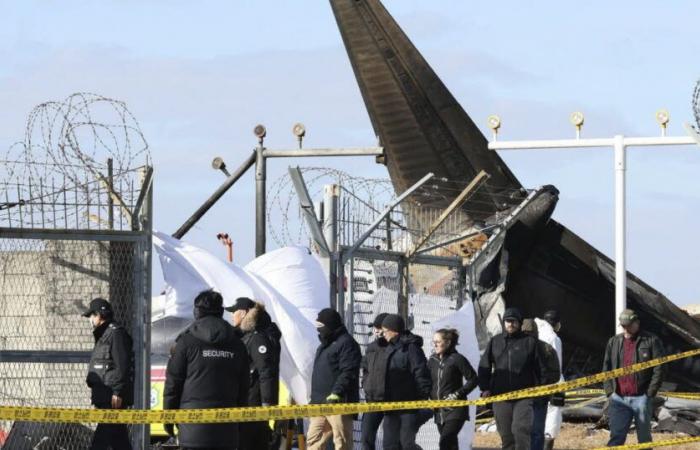One more anomaly on a Boeing plane? The two black boxes of the plane which crashed on December 29 in Muan, South Korea, stopped recording four minutes before the accident, the South Korean Ministry of Transport announced on Saturday. An investigation must explain “the cause of the data loss”.
This Boeing 737-800 from the South Korean low-cost airline Jeju Air landed on its belly, a few seconds before crashing into a locator, installed on a mound reinforced with concrete. A total of 179 passengers died, with only a flight attendant and a steward surviving. Numerous incidents have occurred in recent years on Boeing airliners where the manufacturer was directly responsible, including the disasters of Lion Air’s 737 Max in 2018 and Ethiopian Airlines in 2019, which cost the lives of nearly 350 people. .
Five years later, the consequences of the scandal, which grounded the entire fleet of 737 Max aircraft of the American giant for almost two years, are still being felt both on the legal level (Boeing is not finished with justice American) than financial. After a three-month Boeing employee strike that was very costly for the manufacturer, the latter ended the year 2024 with only 341 planes delivered (compared to 513 in 2023), a layoff plan for 17,000 employees and a stock market share falling by 30%.
Increased transfers to Airbus
The European manufacturer Airbus, which displays a good level of production for the year 2024 (766), is careful not to hammer home its competitor. Boeing’s setbacks affect the entire image of the airline sector. “What we can say is that safety is the number 1 priority for aviation and that the entire industry is aligned on this point,” insists a spokesperson for the consortium between France, Germany, the United Kingdom and Spain. Like any market, the players are interdependent: “Boeing had to lower its prices so as not to lose its customers and Airbus had to fall in line,” underlines Xavier Tytelman, aviation pilot, aeronautical consultant and YouTuber.
The other consequence of these setbacks is the postponement of airline orders from Boeing to Airbus. “The Australian company Qantas, which recently purchased from the two manufacturers, decided to switch its entire fleet to Airbus, even though it was originally 100% Boeing,” explains Xavier Tytelman. At Air France, the entire Transavia fleet will also be standardized with Airbus. »
-However, these reports are still marginal. “It is very difficult to turn a company around,” recalls Christophe Naudin, aeronautical expert*. Companies train mechanics and invest in tools such as flight simulators specific to a type of manufacturer. » For Xavier Tytelman, the new Airbus A321XLR could in particular be a tipping point, the manufacturer having “succeeded in creating a single-aisle with 200 seats which can go to the other side of the world”. For the record, the two largest Airbus fleets in the world are… American: Delta Airlines (493 aircraft) and American Airlines (481).
No risk of bankruptcy at Boeing
Meanwhile, Airbus continues to approach its pre-Covid production levels (863 aircraft in 2019). Although facing difficulties in its supply chain, the European aeronautical giant is doing rather well, especially driven by the “single-aisle” segment (A320neo and A321neo). On the other hand, “on long haul, Boeing is not losing any market share with the 777, the 767 or the 787 because overall the companies lack it,” notes Christophe Naudin. According to Xavier Tytelman, more optimistic, “now that the 737 Max is healthy, Boeing can start putting its energy back into recovery”.
For the future, Airbus is rather calm: its overall order book of 8,658 aircraft represents at the current rate more than 10 years of production. Boeing, for its part, has only 6,188 as of this date, and a good portion is linked to delivery delays and quality control problems. However, the behemoth, which derives only 50% of its turnover from airliners, is not at risk of bankruptcy: “The company brings in a fortune in the United States, particularly in the defense market. They will never let Boeing down,” recalls Xavier Tytelman. Regardless, global demand for aircraft is not about to dry up. The sector expects the global fleet to double by 2050. Many companies will still need Boeing’s services.






